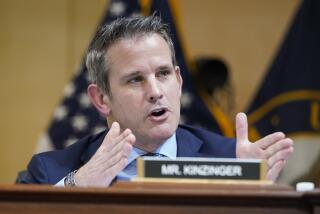Breaking ranks with the GOP
- Share via
WASHINGTON — In 1996, the political world was buzzing about the intentions of a possible presidential contender -- one who could make history.
In the end, Colin L. Powell, four-star American icon, proclaimed that he would not run after all, disappointing millions of supporters but generating sighs of relief at the Clinton White House.
Powell showed over the weekend that he could still affect presidential politics, declaring his support for Democrat Barack Obama.
The prospect of Obama becoming the first African American president, Powell said, would “electrify the world,” and the endorsement is already reverberating.
Given his decades as a professional soldier and high-ranking official in three Republican administrations, Powell carries weight with the military and moderate voters. Now, more of them could swing to Obama.
Even before Obama was first elected to public office as a state senator in Illinois, Powell was considered the odds-on favorite to become the first African American to head a major-party presidential ticket.
He looked to be a formidable candidate in the 1996 race: a black centrist, long an independent, who had led the victorious U.S. military during the 1991 Persian Gulf War. But he declined to run, citing concerns about his privacy and a lack of passion for political combat. There were also reports that his wife, Alma, feared for his safety.
Instead, Powell said, he would join the Republican Party, hoping that his involvement would broaden the GOP’s appeal and humanize its attempts to reform social welfare programs.
“I believe I can help the party of Lincoln move once again close to the spirit of Lincoln,” he said.
With his embrace of Obama, Powell, 71, has broken ranks.
The decision led to debate over his motives. Conservative talk show host Rush Limbaugh suggested Powell’s endorsement was rooted in race and the hope that Obama would become the first black president.
“I am now researching his past endorsements to see if I can find all the inexperienced, very liberal, white candidates he has endorsed,” Limbaugh said in an e-mail. “I’ll let you know what I come up with.”
Powell, in his appearance on NBC’s “Meet the Press,” denied that race was the motivating factor. He said he had pondered a decision for months, and that he had told Obama, “I’ll give you all the advice I can, but I’m not going to vote for you just because you’re black.”
Powell’s decision to cross party lines, former associates said, is far more complicated than black and white.
“It was a painful thing for him to do, for sure,” Larry Wilkerson, a retired Army colonel who was Powell’s chief of staff at the State Department, said in an interview Sunday. “One of the principal parts of his character is defined by loyalty.”
The Republican Party and Republican presidents “have done a lot for his career,” Wilkerson said. Powell was President Reagan’s national security advisor, then served as chairman of the Joint Chiefs of Staff under President George H.W. Bush before he became President George W. Bush’s first secretary of State.
Wilkerson said that Powell ultimately was distressed over what he saw as growing divisiveness in the country and a return to “the vitriol and bigotry and prejudice” of the 1960s.
Adm. Henry Ulrich, the former commander of U.S. naval forces in Europe, said he thought Powell’s decision was not easy.
“Colin Powell is a very, very, very bright, thoughtful person, and I can assure you that he did not enter into this endorsement without giving it lots and lots of thought and give it all the due process it deserved,” Ulrich said. “I think it is remarkable that he has endorsed a Democrat, and so I am sure he didn’t do it lightly.
“Sen. Obama is quite lucky and fortunate,” he added. “It should have made his Sunday.”
--
More to Read
Get the L.A. Times Politics newsletter
Deeply reported insights into legislation, politics and policy from Sacramento, Washington and beyond. In your inbox twice per week.
You may occasionally receive promotional content from the Los Angeles Times.










